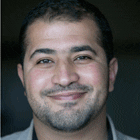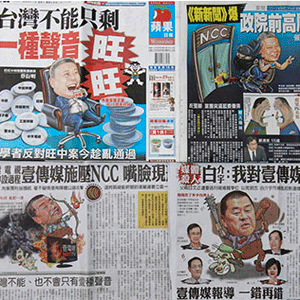Southern Weekly censorship causes nationwide condemnation
A propaganda chief has caused widespread outrage by censoring a Chinese newspaper’s New Year editorial. Southern Weekly, one of the most daring media outlets in the country, has fought back and attracted the support of netizens as well as ordinary folk, who protested today [7 January], calling for press freedom.
The Guangdong Provincial Propaganda Chief, Tuo Zhen, is said to have changed the heading and content of a 2013 new year editorial originally written by Southern Weekly editors. “China’s Dream is a Dream of Constitution” became “We Are Closer to Our Dream Than Ever Before.” No Southern Weekly editor knew until they saw the print edition.
Indignant, Chinese bloggers started discussing this as early as 2 January. In the next few days, noted figures were calling for Tuo’s resignation. Among them was Zhang Yihe, the writer whose memoirs have been banned on the mainland.
Today, after a night of criticisms of microblog platform Sina Weibo’s censoring of Southern Weekly journalists’ accounts — many of whom have either staged a walk out or spoken out — ordinary people in Guangzhou gathered and protested at the headquarters of Southern Weekly.
Wen Yunchao, a rights activist has collected over 100 photos of the protest on Google+. Most people held signs in support of Southern Weekly and in defiance of Tuo Zhen.

Photo of protesters outside the Southern Weekly office by Husker on Sina Weibo
Netizens were also also outraged by a leaked microblog by the journalist Wu Wei, who wrote that he was forced to hand over the password to the Southern Weekly Sina microblog account to the editor-in-chief of the newspaper, Huang Can. Under guidance, a statement was then tweeted from the account, alleging that the New Year’s greeting was “drafted by personnel at Southern Weekly,” extending its apologies to readers for the errors on the front page that were committed due to “lack of time and negligence.”
This caused an uproar, not least because the errors were obviously caused by the propaganda chief, who slotted in his own comments, writing what he wanted without having it checked by news editors. Tuo Zhen is accused of deliberately condensing 2012 as he saw fit, for toeing the Party line, and putting a controversial passage on the front page the prestigious newspaper. The passage began:
Great Yu Controls the Flood, a story from two thousand years ago, taught us the Chinese people’s dream of peace, prosperity, and happiness, fought for through uniting in strength and indomitability.
Not only is this contrary to the message of the original Southern Weekly piece — asking for a “constitution realised and power effectively checked” — but there were two basic mistakes in the opening sentence: One was a wrong character — akin to a typo in English — used for the phrase “uniting in strength”; the other was that Great Yu controlled the flood four thousand years ago, not two.
Dozens of ex-Southern Weekly interns sent out an open letter condemning these mistakes. It was soon deleted by microblog censors. Other journalists at the paper have also commented on how angry they were at these mistakes.
They also rallied at the inside editorial, slashed and re-written without permission from editors.
Wang Xiaoshan, a noted journalist, wrote about holding a vigil for the many Southern Weekly journalists who are facing retribution for their outspoken defiance, with their jobs on the line.
In an open letter from 5 January, Southern Weekly staff wrote:
What happened three days ago was only a trigger. An incomplete calculation has showed that in 2012 Southern Weekly had 1,034 articles changed or killed. In the last year, the newspaper has suffered through unmatched censoring, killing off of articles or even whole pages.
We’re not afraid to offend because we think this concerns the fundamental position of the news media. And because it’s so fundamental, we must be plainspoken. We’re not acting as a result of holding a grudge, but due to the sense of dignity, responsibility, and feeling of achievement that one person should accord another.
Meanwhile, on 4 January Foreign Ministry spokeswoman Hua Chunying said during a weekly press conference:
There is no such thing as so-called media censorship in China. The Chinese government protects press freedom according to the law, and enables full supervision of opinion in the media and of its citizens.

 As Egypt closes 2012 with the approval of a new constitution, Ashraf Khalil reflects on a tumultuous year, and looks ahead to an uncertain future
As Egypt closes 2012 with the approval of a new constitution, Ashraf Khalil reflects on a tumultuous year, and looks ahead to an uncertain future  The $600m sale of Next Media, one of Taiwan’s most popular media companies, has raised the spectre of a media monopoly that could be disastrous for press freedom on the island. Ching-Yi Liu and Weiping Li report
The $600m sale of Next Media, one of Taiwan’s most popular media companies, has raised the spectre of a media monopoly that could be disastrous for press freedom on the island. Ching-Yi Liu and Weiping Li report